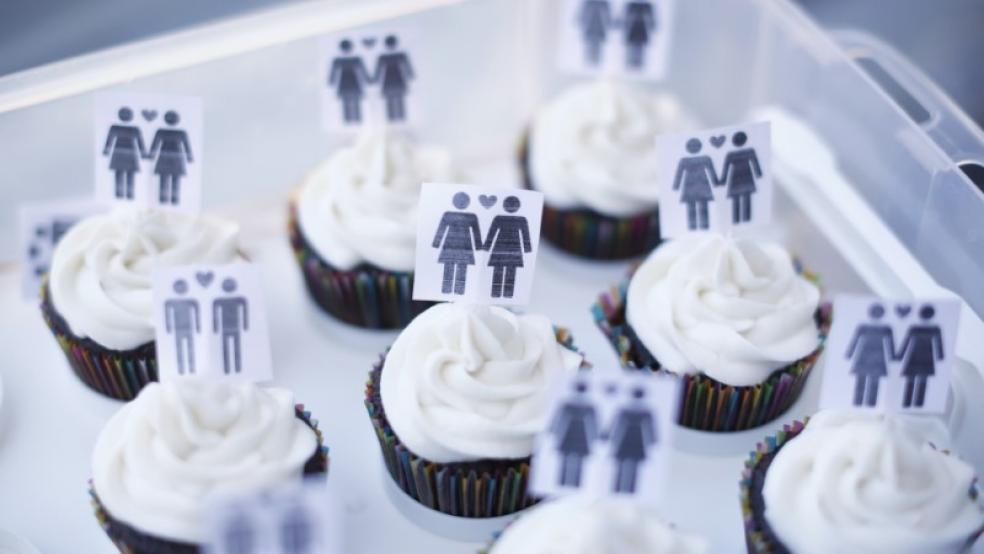The Supreme Court on Friday delivered a historic victory for gay rights, ruling 5 to 4 that the Constitution requires that same-sex couples be allowed to marry no matter where they live and that states may no longer reserve the right only for heterosexual couples.
The court’s action marks the culmination of an unprecedented upheaval in public opinion and the nation’s jurisprudence. Advocates called it the most pressing civil rights issue of modern times, while critics said the courts had sent the country into uncharted territory by changing the traditional definition of marriage.
“Under the Constitution, same-sex couples seek in marriage the same legal treatment as opposite-sex couples, and it would disparage their choices and diminish their personhood to deny them this right,” Justice Anthony Kennedy wrote in the majority opinion. He was joined in the ruling by the court’s liberal justices Ruth Bader Ginsburg, Stephen G. Breyer, Sonia Sotomayor and Elena Kagan.
Related: The 7 Best Lines from Justice Scalia’s Blistering Obamacare Dissent
All four of the court’s most conservative members — Chief Justice John G. Roberts Jr. and Justices Antonin Scalia, Clarence Thomas and Samuel A. Alito Jr. — dissented and each wrote a separate opinion, saying the court had usurped a power that belongs to the people.
Reading a dissent from the bench for the first time in his tenure, Roberts said, “Just who do we think we are? I have no choice but to dissent.”
In his opinion, Roberts wrote: “Many people will rejoice at this decision, and I begrudge none their celebration. But for those who believe in a government of laws, not of men, the majority’s approach is deeply disheartening.”
Scalia called the decision a “threat to American democracy,” saying it was “constitutional revision by an unelected committee of nine.”
There were wild scenes of celebrations on the sidewalk outside the Supreme Court, as same-sex marriage supporters had arrived early, armed with signs and rainbow flags. They celebrated the announcement of a constitutional right to something that did not legally exist anywhere in the world until the turn of the new century.
Related: Presidential Candidates Respond to SCOTUS Obamacare Ruling
This country’s first legally recognized same-sex marriages took place just 11 years ago, the result of a Massachusetts state supreme court decision. Now, more than 70 percent of Americans live in states where same-sex couples are allowed to marry, according to estimates.
The Supreme Court used cases from Michigan, Ohio, Kentucky and Tennessee, where restrictions about same-sex marriage were upheld by an appeals court last year, to find that the Constitution does not allow such prohibitions.
The questions raised in the cases were left unanswered in 2013, when the justices last confronted the issue of same-sex marriage. A slim majority of the court said at the time that a key portion of the Defense of Marriage Act — withholding the federal government’s recognition of same-sex marriages — was unconstitutional. In a separate case, the court said procedural issues kept it from answering the constitutional question in a case from California, but that move allowed same-sex marriages to resume in that state.
Since then, courts across the nation — with the notable exception of the Cincinnati-based federal appeals court that left intact the restrictions in the four states at issue — have struck down a string of state prohibitions on same-sex marriage, many of them passed by voters in referendums.
When the Supreme Court declined to review a clutch of those court decisions in October, same-sex marriage proliferated across the country.
Public attitudes toward such unions have undergone a remarkable change as well. A recent Washington Post-ABC poll showed a record 61 percent of Americans say they support same-sex marriage. The acceptance is driven by higher margins among the young.
Related: How Gay Marriage Can Help Reduce the Deficit
When the justices declined in October to review the string of victories same-sex marriage proponents had won in other parts of the country, it meant the number of states required to allow gay marriages grew dramatically, offering the kind of cultural shift the court often likes to see before approving a fundamental change.
The Obama administration had urged the court to find that the Constitution requires such restrictions be struck down, and Solicitor General Donald B. Verrilli Jr. made the case on behalf of the administration at the court’s oral arguments in April.
“In a world in which gay and lesbian couples live openly as our neighbors, they raise their children side by side with the rest of us, they contribute fully as members of the community . . . it is simply untenable — untenable — to suggest that they can be denied the right of equal participation in an institution of marriage, or that they can be required to wait until the majority decides that it is ready to treat gay and lesbian people as equals,” he said.
The combined cases decided by Friday’s ruling are known as Obergefell v. Hodges.





